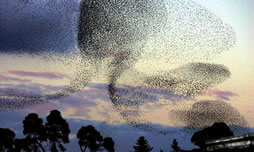Spectrum | 19.08.2008 | 04:30
The Rainbow's Ghostly Cousin
In a moment of science Don Glass tells us about a rainbow’s ghostly cousin -- – the fogbow. These are also known as “white rainbows" or "cloudbows". Mariners sometimes call them "sea-dogs."
━━ n., a. 虹(にじ); ゲイの人権を支持する.
Rainbow Bridge レインボー・ブリッジ ((Utah州南部の天然の石橋)).
rainbow coalition 〔米〕 虹(色)の提携 ((社会的・政治的な問題についての異人種間の連帯)).
rainbow flag (同性愛者人権運動の旗印である)レインボー・フラッグ, 虹の旗.
rainbow trout 【魚】ニジマス.
Rainbow Warrior (the 〜) レインボーウォリアー(号) ((Greenpeace が活動に使用する船)).
Birds of a feather flock together
MeaningThose of similar taste congregate in groups.
Origin
This proverb has been in use since at least the mid 16th century. In 1545, William Turner used a version of it in his papist satire The Rescuing of Romish Fox:
"Byrdes of on kynde and color flok and flye allwayes together."The first known citation in print of the currently used English version of the phrase appeared in 1599, in The Dictionarie in Spanish and English, which was compiled by the English lexicographer John Minsheu:
Birdes of a feather will flocke togither.The phrase also appears in Benjamin Jowett's 1856 translation of Plato's Republic. Clearly, if the it were present in the original Greek text then, at around 380BC, Plato's work would be a much earlier reference to it. What appears in Jowett's version is:
Men of my age flock together; we are birds of a feather, as the old proverb says.Plato's text can be translated in other ways and it is safe to say it was Jowett in 1856, not Plato in 380BC, that considered the phrase to be old. The lack of any citation of it in English prior to the 16th century does tend to suggest that its literal translation wasn't present in The Republic - a text that was widely read by English scholars of the classics well before the 16th century.
 In nature, birds of a single species do in fact frequently form flocks. Ornithologists explain this behaviour as a 'safety in numbers' tactic to reduce their risk of predation. In language terms, it was previously more common to refer to birds flying together than flocking together and many early citations use that form, for example Philemon Holland's translation of Livy's Romane historie, 1600:
In nature, birds of a single species do in fact frequently form flocks. Ornithologists explain this behaviour as a 'safety in numbers' tactic to reduce their risk of predation. In language terms, it was previously more common to refer to birds flying together than flocking together and many early citations use that form, for example Philemon Holland's translation of Livy's Romane historie, 1600:"As commonly birds of a feather will flye together."See also: the List of Proverbs.
The Phrase A Week newsletter goes to 94,500 subscribers (74,000 by e-mail, 20,500 by RSS feed).
Please help support this newsletter.

沒有留言:
張貼留言